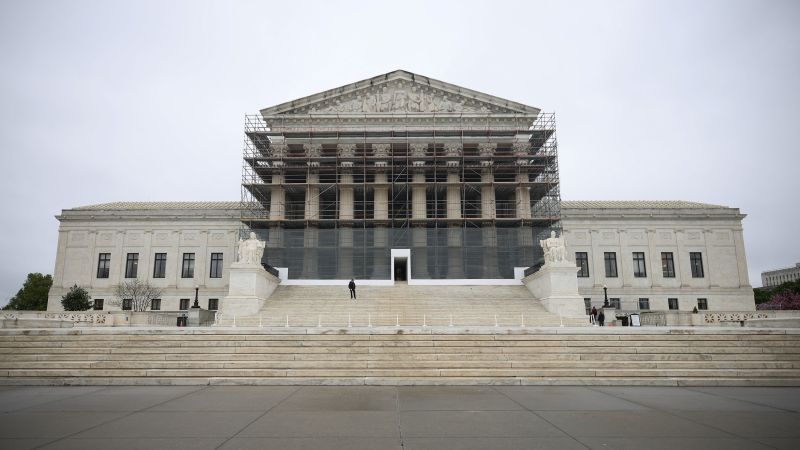Landmark Supreme Court Decision Impacts Reverse Discrimination Litigation

Welcome to your ultimate source for breaking news, trending updates, and in-depth stories from around the world. Whether it's politics, technology, entertainment, sports, or lifestyle, we bring you real-time updates that keep you informed and ahead of the curve.
Our team works tirelessly to ensure you never miss a moment. From the latest developments in global events to the most talked-about topics on social media, our news platform is designed to deliver accurate and timely information, all in one place.
Stay in the know and join thousands of readers who trust us for reliable, up-to-date content. Explore our expertly curated articles and dive deeper into the stories that matter to you. Visit Best Website now and be part of the conversation. Don't miss out on the headlines that shape our world!
Table of Contents
Landmark Supreme Court Decision Impacts Reverse Discrimination Litigation
The Supreme Court's recent ruling in Students for Fair Admissions, Inc. v. President & Fellows of Harvard College has sent shockwaves through the legal landscape, significantly impacting not only affirmative action policies in higher education but also the broader field of reverse discrimination litigation. This landmark decision, while focused on race-conscious admissions, has far-reaching implications for how courts will interpret and apply Title VII of the Civil Rights Act of 1964, which prohibits employment discrimination based on race, color, religion, sex, or national origin.
The Court's majority opinion, emphasizing the principle of colorblindness, challenges the long-standing precedent that allowed for race to be considered as one factor among many in admissions decisions. This emphasis on a strictly race-neutral approach raises concerns for those who argue that ignoring historical and systemic inequalities perpetuates discrimination against minority groups. The decision’s impact on reverse discrimination lawsuits, where individuals from majority groups claim discrimination due to affirmative action or diversity initiatives, is already being felt.
What Does This Mean for Reverse Discrimination Cases?
The Students for Fair Admissions case provides a powerful new argument for plaintiffs alleging reverse discrimination. Previously, courts often considered the broader societal context of historical discrimination when evaluating such claims. Now, the Supreme Court's emphasis on individual merit and race-neutral evaluation could lead to a stricter standard for proving discriminatory intent, potentially making it more difficult for plaintiffs alleging reverse discrimination to succeed.
This shift in legal interpretation could manifest in several ways:
- Increased Success Rate for Reverse Discrimination Lawsuits: Law firms specializing in employment law are likely to see a surge in reverse discrimination cases, with plaintiffs emboldened by the Supreme Court's emphasis on race neutrality.
- Heightened Scrutiny of Diversity Initiatives: Companies and institutions with robust diversity, equity, and inclusion (DEI) programs may face increased scrutiny, particularly if those programs involve race-conscious considerations in hiring or promotion decisions. These programs, once considered best practices, may now be viewed as potential targets for litigation.
- Shift in Legal Strategies: Attorneys representing both plaintiffs and defendants will need to adapt their legal strategies to account for the Supreme Court's new precedent. This may involve a greater focus on demonstrating individual merit and avoiding even the appearance of race-conscious decision-making.
The Broader Implications Beyond Higher Education
The consequences extend far beyond college admissions. The decision's impact on employment practices, particularly in sectors with a history of underrepresentation, remains a significant area of concern. Companies may become hesitant to implement proactive diversity initiatives for fear of potential lawsuits. This could inadvertently hinder efforts to create more equitable and inclusive workplaces.
Looking Ahead: Uncertainty and Adaptation
The legal landscape surrounding reverse discrimination is now undeniably altered. The Supreme Court's decision introduces considerable uncertainty, forcing organizations to reassess their DEI strategies and potentially leading to a period of legal adjustments and adaptations. The coming years will likely see a flurry of litigation, shaping a clearer understanding of how this landmark ruling will be applied in practice. This situation necessitates careful consideration by businesses and institutions to ensure compliance with the law while upholding their commitment to diversity and inclusion. Consulting with legal experts specializing in employment law and DEI compliance is crucial during this period of transition.
Further Reading:
This landmark decision is a significant development in the ongoing debate surrounding affirmative action and equality. The long-term consequences remain to be seen, but the immediate impact on reverse discrimination litigation is undeniable. Staying informed about legal developments in this area is crucial for individuals, businesses, and institutions alike.

Thank you for visiting our website, your trusted source for the latest updates and in-depth coverage on Landmark Supreme Court Decision Impacts Reverse Discrimination Litigation. We're committed to keeping you informed with timely and accurate information to meet your curiosity and needs.
If you have any questions, suggestions, or feedback, we'd love to hear from you. Your insights are valuable to us and help us improve to serve you better. Feel free to reach out through our contact page.
Don't forget to bookmark our website and check back regularly for the latest headlines and trending topics. See you next time, and thank you for being part of our growing community!
Featured Posts
-
 Caa Football Responds To Villanovas Exit Key Implications
Jun 06, 2025
Caa Football Responds To Villanovas Exit Key Implications
Jun 06, 2025 -
 The Next Black Panther Marvels Risky Bet And Fan Reaction
Jun 06, 2025
The Next Black Panther Marvels Risky Bet And Fan Reaction
Jun 06, 2025 -
 Lilibet Mountbatten Windsor Turns Four See The Heartwarming Photos From Meghan
Jun 06, 2025
Lilibet Mountbatten Windsor Turns Four See The Heartwarming Photos From Meghan
Jun 06, 2025 -
 Impact Of Villanova Leaving Caa Football For Players Fans And The Conference
Jun 06, 2025
Impact Of Villanova Leaving Caa Football For Players Fans And The Conference
Jun 06, 2025 -
 Pre Earnings Options Playbook Maximizing Returns On Broadcom Stock
Jun 06, 2025
Pre Earnings Options Playbook Maximizing Returns On Broadcom Stock
Jun 06, 2025
Latest Posts
-
 Ibm From Legacy Tech To Modern Innovator
Jun 06, 2025
Ibm From Legacy Tech To Modern Innovator
Jun 06, 2025 -
 Rebranding Big Blue Is Ibm Relevant In Todays Tech Landscape
Jun 06, 2025
Rebranding Big Blue Is Ibm Relevant In Todays Tech Landscape
Jun 06, 2025 -
 Bidens Former Press Secretary Karine Jean Pierre Announces Independent Status
Jun 06, 2025
Bidens Former Press Secretary Karine Jean Pierre Announces Independent Status
Jun 06, 2025 -
 Sussex Pregnancy Announcement Meghans Dancing Celebration
Jun 06, 2025
Sussex Pregnancy Announcement Meghans Dancing Celebration
Jun 06, 2025 -
 Taylor Lewans Wild Pitch Cardinals Game Opening Fails Spectacularly
Jun 06, 2025
Taylor Lewans Wild Pitch Cardinals Game Opening Fails Spectacularly
Jun 06, 2025
